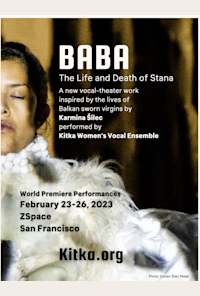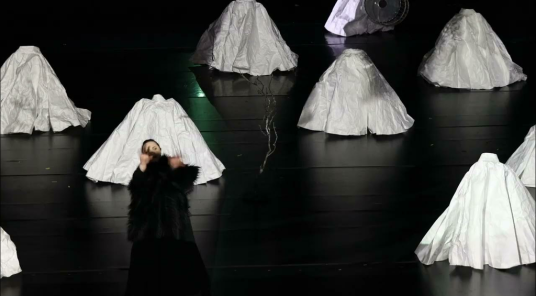BABA
The Life and death of Stana
Music theatre by Karmina Silec
Performers: Kitka ensemble
for vocalists of extended vocal techniques, instruments, electronics
BABA is inspired by the sworn virgins – the women who, after taking vows of chastity, adopt a man's name and identity, wear men's clothes, do men's work, smoke, drink rakia, play the gusle ... and join the men's world.
The music theatre will draw on anthropological research on this practice to develop a multi-faceted performative form.
BABA offers a journey through places and times that bend under the fruits of the romantic Western imagination. Homer, the virdzina, the muškarača, the tobelia, the blind woman, and Stana live in the region that today we call the Balkans. The performance creates an intuitive conceptual network between music, the Western view, sweet sorrow, hetero-romantic ideology and Adam’s rib, phallocentrism and virginity. It talks about the otherness, the institution of sworn virgins, and about the dilemma over whether virdzina’s becoming a man is an illusion, violence, or salvation.
BABA is a canvas on which the contents of society's consciousness, its beliefs, the history and the present, knowledge and delusions are projected. It reminds us of the narrow-mindedness of the society that condemns every step and every action; it sang praises to women with a vocabulary adorned with the notions such as tradition, family, honour, and dignity, and caching mythomania and misogyny behind them. It reminds us who created and buried the heroines Flora, Liljana, Suni, Lindita,...
In contemporary liberal society, we cherish our freedom of choice in our ways of life, vocations, worldviews, religion, style, and selection of commodities as well as in our sexual preferences and gender identity. The sworn virgins phenomenon presents a fascinating counterpart to this venerated freedom. These women, who became men, did so more for the sake of survival than self-realization or choice, and while their transformation garnered them unprecedented freedoms and status, it also came at a steep price.
Who is a sworn virgin and what is her identity? Does she really subordinate to the imperative of the community, or does she take things in her own hands? How does it feel to lose the language of your body, a language you never really learned? What is her perception of self and perception of ‘other’, against whom is she actually established or being defined? Is she unhappy, a disappointed woman who decided not to work the spinning wheel anymore and move on?
BABA holds a mirror to the constraints and choices relating to gender and sexuality that are coming to light today.The theme that revolves around the sworn virgins resembles a translucent curtain, behind which the viewers – while perceiving the events on the outskirts of Europe, somewhere in the mountains of the Balkans – stay aware of the fact that what they are watching is "neither the only time, nor the only place".
*The stories in Baba are fictional and imaginatively recreate life.
* performance includes actions of smoking, drinking alcohol, chest binding and use of heavy words
ON MUSIC
Musical language is fictional ethnicity or fictional references to traditional heritage.
The multiplication of the junctions between several acoustic cultures. The gusle, iso–polyphony, voice processing and the so-called western music produce different and unexpected juxtapositions as the compositional concept brings crossings and hybridizations of otherwise distant music identities, histories and traditions. Music plays with dualities between the sacred and the profane, the urban and the rural, folk and ‘high’, the analogue and the digital, the monophonic and the polyphonic …
The project involves a concept of electroacoustic music where sound sources get transformed and manipulated, partly in a custom-made device. Pre-recorded parts are processed, using sworn virgins’ voices, vocal sounds, tepsija’s (baking pan from Balkan) and gusle’s (one string ethnical instrument from Balkan) sounds and hybridize strings instruments sounds. In the context of these synthesized sounds, extended vocal techniques of Kitka blend with acoustic and electro-acoustic media. They are idiomatically integrated.
BABA is inspired by the last surviving oral poetry laboratorium in the Homeric oral poetry tradition-guslari. The gusle is the perfect alter ego instrument because it is so close to the human voice. At the same time it is a symbolic instrument of male power, a sacred object of patriarchy. For the project, a modern version of the gusle was developed, a symbolic re-inclusion of the one string folk instrument, mostly in its function related to singing and storytelling. The (privileged) position of the male epic singer is taken over by women artists.
Some thematic materials for the vocal parts are inspired with iso-polyphony, a traditional Albanian music. The old time inspired music sections consist of two solo vocal parts, a melody and a countermelody, and a choral drone.



